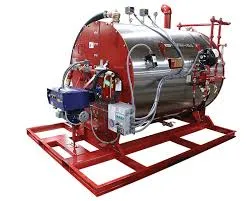
Sep . 28, 2024 19:07 Back to list
Comparison of Steam Boilers and Hot Water Boilers for Efficient Heating Solutions
Steam Boiler vs. Hot Water Boiler Understanding the Differences
In the world of heating systems, the choice between a steam boiler and a hot water boiler is crucial for efficiency, comfort, and cost-effectiveness. Both types of boilers are widely used in residential and commercial settings, yet they differ significantly in their design, operation, and application. Understanding these differences can help consumers make informed decisions about their heating needs.
Basic Definitions
A steam boiler operates by heating water to a point where it transforms into steam. This steam is then circulated through pipes and radiators, providing heat to the enclosed spaces. The primary advantage of steam boilers is their ability to deliver heat quickly and efficiently. However, they typically operate at higher pressures and temperatures, which can pose safety concerns if not properly maintained.
On the other hand, hot water boilers heat water to a lower temperature than steam boilers and distribute the hot water through a system of pipes to radiators or baseboard heaters. They generally operate at lower pressures and are considered safer because of the reduced risk of explosion.
Efficiency and Fuel Consumption
When comparing efficiency, hot water boilers generally have an edge over steam boilers. While the efficiency rates of both types can vary based on make and model, hot water boilers tend to be less prone to heat loss. This efficiency translates into lower energy bills, making hot water boilers a more economical choice over time.
In terms of fuel consumption, steam boilers can use more energy due to the heat required for generating steam. This higher energy consumption can lead to increased operational costs, although some modern steam boilers are designed to be more energy-efficient than their older counterparts.
Heating Response and Temperature Control
steam boiler vs hot water boiler

Steam boilers provide rapid heating because steam is generated and distributed almost instantaneously. This can be particularly beneficial in environments where quick heat is necessary, such as commercial spaces or during extremely cold weather.
Hot water boilers, however, provide a more consistent and steady heat. The system can maintain a more even temperature, which contributes to overall comfort in a space. Additionally, hot water systems often allow for more sophisticated temperature control options, including zoning systems that enable different areas of a building to be heated to varying temperatures based on occupancy and use.
Maintenance and Longevity
Both types of boilers require regular maintenance to ensure optimal performance, but steam boilers generally demand more attention. The production of steam can lead to more wear and tear on components, including valves and pipes. Moreover, steam boilers can accumulate scale and sediment more quickly, necessitating more frequent cleaning and servicing.
Hot water boilers tend to be less complex and may require less maintenance overall. They have fewer moving parts, and their operation typically results in lower levels of mineral buildup. Consequently, a hot water boiler can have a longer lifespan, particularly if properly maintained.
Applications and Considerations
The choice between a steam boiler and a hot water boiler often comes down to the specific heating needs of the user. Steam boilers are excellent for larger spaces that need rapid and powerful heating, making them ideal for commercial buildings and industrial applications. Conversely, hot water boilers are suited for residential settings or smaller commercial spaces, where consistent and comfortable heating is paramount.
Ultimately, when selecting between a steam boiler and a hot water boiler, consumers should consider factors such as heating requirements, fuel availability, initial investment costs, and long-term operating expenses. Consulting with a heating professional can also provide valuable insights tailored to individual needs and situations.
In conclusion, both steam and hot water boilers have their advantages and disadvantages. Understanding these differences enables users to make informed choices that align with their heating requirements, budget, and safety considerations.
-
High-Efficiency Commercial Oil Fired Steam Boiler for Industry
NewsJul.30,2025
-
High-Efficiency Biomass Fired Thermal Oil Boiler Solutions
NewsJul.30,2025
-
High Efficiency Gas Fired Thermal Oil Boiler for Industrial Heating
NewsJul.29,2025
-
High-Efficiency Gas Fired Hot Water Boiler for Sale – Reliable & Affordable
NewsJul.29,2025
-
High Efficiency Biomass Fired Hot Water Boiler for Industrial and Commercial Use
NewsJul.29,2025
-
High-Efficiency Biomass Fired Hot Water Boiler for Industrial Use
NewsJul.28,2025
Related PRODUCTS






















